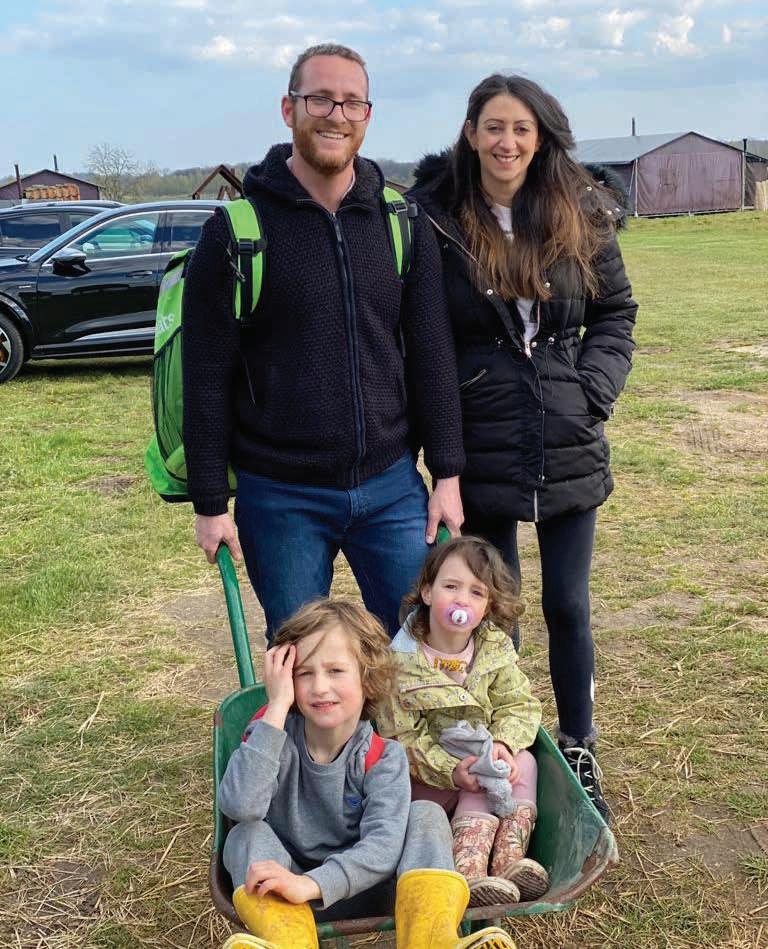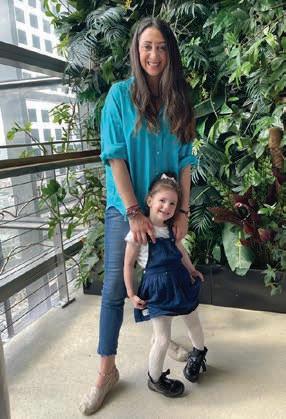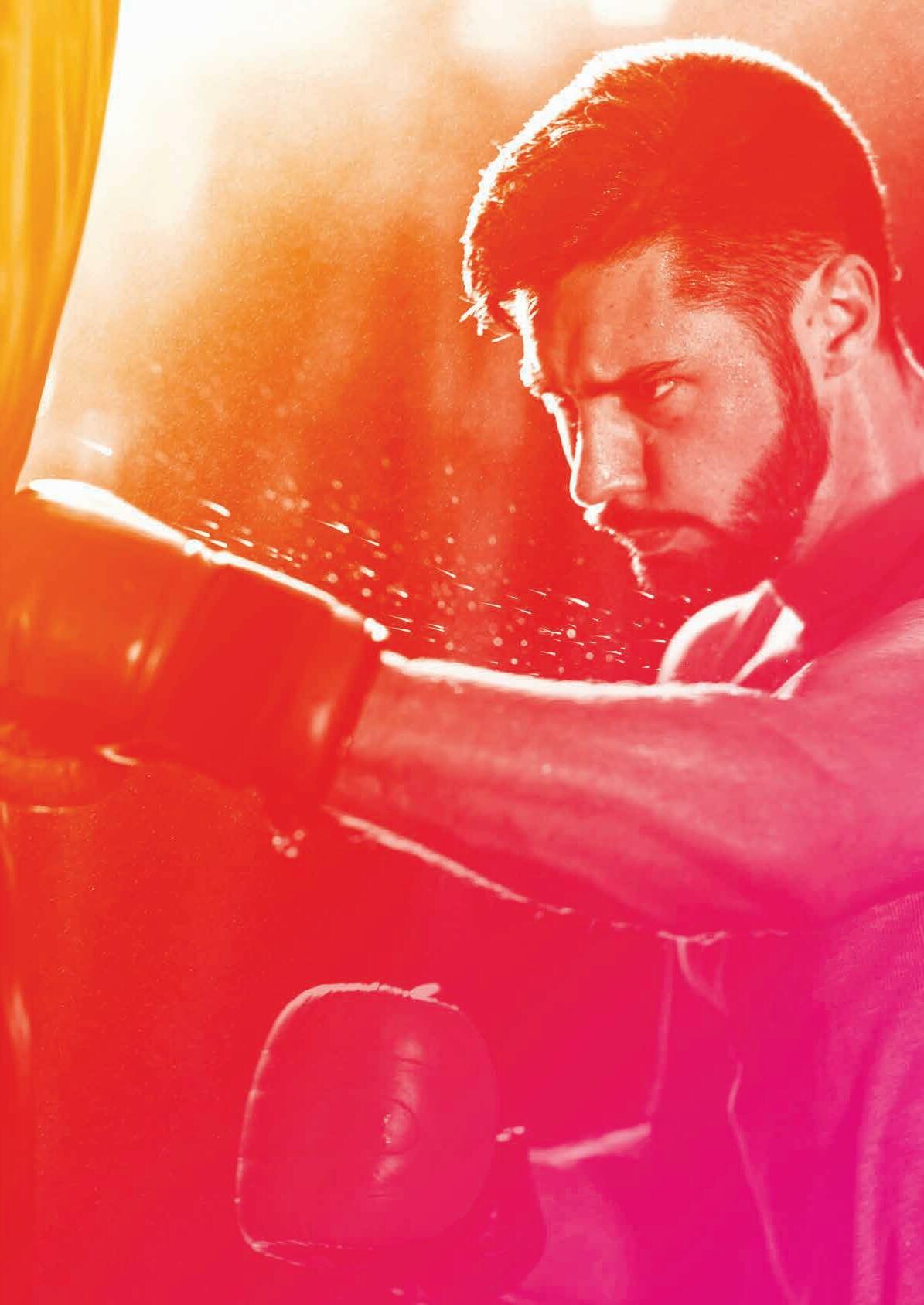
7 minute read
Health & wellbeing
What I Learnt Through My NearFatal Ectopic Pregnancy
By Lauren Vaknine
Advertisement
We’re renovating our new home at the moment, and as a result we’ve been living at my husband’s parents. And the last place you want to have a miscarriage, it turns out, is in the pristine white china bowl of your mother in law’s toilet.
So a week ago I decided to stay at my mums for a night, so I could grieve openly and be afforded the luxury of not having my children barge into the bathroom as a deluge of gunmetal-brown lumps resembling uncooked chicken livers escaped my insides. Because that happened before I left. And I sat on the toilet screaming for my husband to come and take our three-year-old daughter out for five whole minutes before he heard me. Why didn’t he hear me?
Lying in my old bed in my childhood bedroom last week, I realised that I’d bitten off all my nail varnish and bitten my nails right down, placing the displaced pieces of white crescent moons and tiny peelings of dried nail polish – like fragments of dried blood – in a tissue on my bedside.
Do I usually bite my nails? No. Did it make me feel better? No. Will it bring back the baby? No. What made me do it? I don’t know. It was unconscious. There is no logic to be found in the actions of grief. And there is no making sense of the unwinding of our lives, like a piece of yarn all tight and perfectly bound, that just comes undone, as if out of nowhere. What we do intuitively make sense of as soon as it starts to sag and droop in what look like single dregs where it was once a whole, is that it will never look that perfect again.
The day after the nail massacre, when I assumed I simply had the task of processing a miscarriage, the scan I was booked in for because my hCG levels were still higher than was normal for a miscarriage, showed that I hadn’t, in fact, lost my baby.
My baby was growing on my left ovary.
A rare sort of ectopic pregnancy.
The most common kind of ectopic pregnancy is when the baby never makes it through the fallopian tube to the womb,
and instead gets stuck in the tube, but, true to my unconventional nature, I was the anomaly; the one to whom the doctor said: “I’ve heard of ovarian ectopics of course, but I’ve never seen one myself.”
A series of inconceivable events were about to take place, but of all the many life-defining moments that make up this trauma, seeing the heartbeat of the baby that was growing inside me, knowing that she was trying to live, through all adversity – a bit like my own life story – and that I couldn’t save her, that will be the scene I can never delete.
“I know you’re in shock,” Dr Karoshi said to me, “but we really do have to get you into surgery to remove the pregnancy before it ruptures. If it ruptures, it could be fatal.”
So everyone starts bumbling around, calling down to operating theatres, writing reports, bringing me mesh knickers and DVT stockings, my husband zooming home to grab some bits for me. All the while I’m sitting in the waiting room of the early pregnancy unit, staring at the cover of a gossip magazine on the table in front of me – the kind hospitals always have – trying to process the shock. Knowing that every time I see an image of Cheryl Cole from now on, I’ll be taken back to that waiting room, wondering why on earth anyone would be forced to remove a baby that had a beating heart, a baby they wanted, from within them.
And the unlikely part of this unquenchable grief is that despite how much we wanted this baby, we didn’t even plan this pregnancy. Two IVF babies later, we’d closed the door on that idea, the one that for others is a choice.
As a life coach, and someone who used to be severely disabled and is now fully able-bodied, I’m acutely aware that behind every trauma is an opportunity for growth, a lesson that will enhance our life in some way.
And as, out of nowhere in this waiting room, I doubled over in pain because the pregnancy had gone and done the thing they were saying they hoped it wouldn’t do and it ruptured. I knew the life-threatening nature of what was happening to me now, was there to distract my mind from the thoughts of the baby with the heartbeat, the one I could no longer save.
We all know that adage “it could always be worse”. My experience has led me to believe that sometimes the ‘worst’ is there to make us wish for what we thought was the worst before the current worst started. It’s there to help us see that we never think we’re lucky until something happens that makes us realise we weren’t actually that unlucky.
Monks, hippies and influencers alike speak about the merits of a life spent in gratitude. But is there a way to live in that perpetual state of gratitude, regardless of how dire the situation?
It turns out over a litre of blood had collected inside my pelvis, and the doctors must have been so worried, that they let my husband into the operating theatre with me so we could say our goodbyes while they put a second cannula in to get me hooked up to the anaesthetic, because the first one wasn’t working. (I would go so far as to say that the pain of the insertion of a cannula in a rush pretty much matches up to that of internal bleeding.)
Through all the health issues I’ve faced in my life, none were ever life-threatening. I’ve grown up with spiritual parents and among spiritual teachers, so I never feared death, not even as a young child; I always had an unconventional acceptance and embracing of it.
But then you have children. And death holds new meaning. It means the ruining of the lives you brought into the world – because the lives of a six and three-year-old who lose their mother will be ruined – and it no longer becomes an option.
I knew it wasn’t an option, and I knew, deep down, that I’d be ok, but through the intensity of it all, I still found myself embroiled in the dramatic conversation with my husband of how to raise the kids. their unconscious behaviours are telling you that they are being bullied or whether the way they look or seem is telling you they are unwell, don’t ever stop listening. That’s all that matters. I’ve learnt many things through my work but the one thing that I’ve noticed links all people, the one thing we all have in common when it comes to working through our pasts, our issues, our challenges, is the moments we weren’t seen, heard or validated. The moments when we were overlooked. When our needs – for one reason or another and often despite the best intentions of our parents – were not met.

Perhaps my ‘worst’ was to remind me – through an experience I’ll never forget and a lesson I’ll always keep close, that my sole purpose as a mother is not to feed and clothe and house my children (that should go without saying) but to truly hear them.
And of all the things I could have told him, what I knew was important was this and this alone: And what of the baby with the heartbeat that I wanted so much?
Listen to them. Hear them. Validate them. Whatever they are saying to you, don’t dismiss it like it doesn’t matter. Whether they’re telling you they don’t want to wear those trousers today or whether Perhaps she’s talking to me too, in an otherworldly way, offering me this lesson.
Perhaps that was the purpose.
You can check out all Lauren’s work, including her Recondition Your Life Academy and retreats, at www.laurenvakninecoaching.com, her blog www.laurenvaknine.co.uk and you can follow her on Instagram @laurenvaknine
BEAT THE BURN








